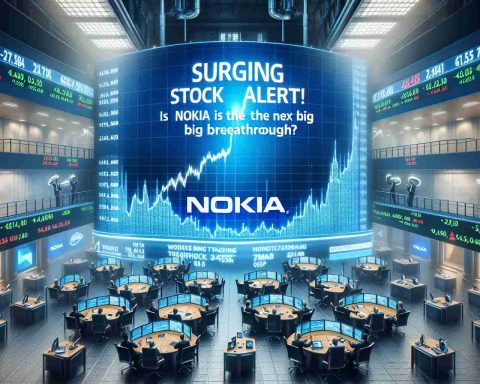Nokia Corporation Announces Major Share Buyback
On January 17, 2025, Nokia Corporation, a prominent player in the telecommunications industry, made headlines by repurchasing a substantial number of its own shares. This strategic move involved acquiring 872,093 shares at a weighted average price of €4.39 each.
The decision to buy back shares comes in the wake of Nokia’s prior announcement regarding the initiation of a share buyback program aimed at mitigating the dilution caused by new shares issued to Infinera Corporation shareholders and based on share-based incentives. This program, announced on November 22, 2024, is set to continue until the end of 2025, with plans to repurchase up to 150 million shares at a total expenditure of €900 million.
The total cost incurred by Nokia for the transactions on January 17 reached €3,826,308. Following this repurchase, Nokia now holds a total of 230,835,359 treasury shares.
This bold action is part of Nokia’s broader strategy to enhance shareholder value while navigating the evolving landscape of technology and telecommunications. Known for its commitment to creating integrated and high-performance networks, Nokia continues to be a trusted partner for service providers and enterprises worldwide.
For further inquiries, Nokia Communications can be reached for more detailed information regarding their initiatives.
Wider Implications of Nokia’s Share Buyback Initiative
Nokia Corporation’s recent share buyback not only signifies a tactical financial maneuver but also reflects broader trends in corporate governance and economic resilience within the telecommunications sector. By opting to repurchase shares, Nokia is actively engaged in enhancing shareholder value, which can bolster investor confidence and influence the stock market’s perception of corporate viability amid shifting global dynamics.
This decision comes at a time when technology firms are scrutinized for both their financial practices and their roles in advancing sustainable development. As telecommunications infrastructure becomes increasingly critical for digitization in various industries, Nokia’s focus on integrated networks aligns with global trends toward technological advancement and efficiency. The global economy is continually evolving, and investments in telecommunications support a plethora of sectors—from health care to education—enabling digital transformation and innovation.
The environmental implications of such corporate strategies also merit consideration. As companies like Nokia expand their technological footprints, their commitment to sustainability can foster advancements in green technologies, potentially reducing carbon emissions associated with telecommunications infrastructure. In an age where corporate social responsibility is paramount, shareholders and consumers alike are drawn to companies that prioritize sustainable practices.
Looking ahead, Nokia’s bold share buyback could set a precedent for other companies in the tech space, promoting a trend of strategic financial decisions aimed at bolstering company resilience and stakeholder value in an uncertain global marketplace. The long-term significance of such measures may well redefine how firms navigate the complexities of shareholder expectations and environmental accountability.
Nokia’s Strategic Share Buyback: What It Means for Investors
Overview of Nokia’s Share Buyback Program
On January 17, 2025, Nokia Corporation announced a significant repurchase of its own shares, acquiring 872,093 shares at a weighted average price of €4.39 each. This buyback is a crucial component of Nokia’s broader strategy to enhance shareholder value and counteract the dilution associated with new shares issued to Infinera Corporation shareholders and other share-based incentives.
Details of the Buyback Initiative
The share buyback program, initiated on November 22, 2024, has a goal to repurchase up to 150 million shares for a total of €900 million, and it is expected to run until the end of 2025. The recent share acquisition on January 17 cost Nokia approximately €3.83 million, bringing the total number of treasury shares held by the company to 230,835,359.
Pros and Cons of Share Buyback Programs
# Pros:
– Increases Earnings Per Share (EPS): By reducing the number of shares outstanding, buybacks can improve EPS, making the company’s stock more attractive to investors.
– Enhances Shareholder Value: Directly returning capital to shareholders, especially in times of uncertainty, signals confidence in the company’s financial health.
– Counteracts Dilution: Helps maintain shareholder value by offsetting the impact of new shares issued through incentives.
# Cons:
– Short-term Focus: Critics argue that share buybacks can divert funds from potentially more beneficial long-term investments, such as research and development.
– Market Perception: If not executed carefully, buybacks can lead to negative market perceptions regarding the company’s growth prospects.
Market Analysis and Trends
The telecommunications industry is undergoing rapid changes with advancements in technology and increasing competition. Companies like Nokia are adapting through strategic financial maneuvers such as share buybacks. Increased investments in digital infrastructures such as 5G networks and the Internet of Things (IoT) signal a strong demand for robust telecommunications services, making Nokia’s buybacks a potentially strategic move to stabilize its stock in a volatile market.
Future Predictions for Nokia
Analysts predict that if Nokia continues this trend of share buybacks while investing in innovation and expansion, it could strengthen its position in the market. Increased focus on integrated networks and partnerships with service providers could provide further upside to their stock performance.
Insights into Nokia’s Innovations
Nokia’s commitment to developing high-performance networks through advanced technologies like 5G and edge computing continues to set it apart in the telecommunications sector. By enhancing its infrastructure capabilities, Nokia is poised to attract more clients and solidify its standing as a leading service provider.
Conclusion
Nokia’s recent share buyback initiative represents a strategic effort to enhance shareholder value in a competitive landscape. As the telecommunications market evolves, such financial strategies coupled with investment in future technologies may well position Nokia for sustained growth and competitiveness. For further details on Nokia’s financial strategies and telecommunications initiatives, you can visit Nokia’s official website.





















